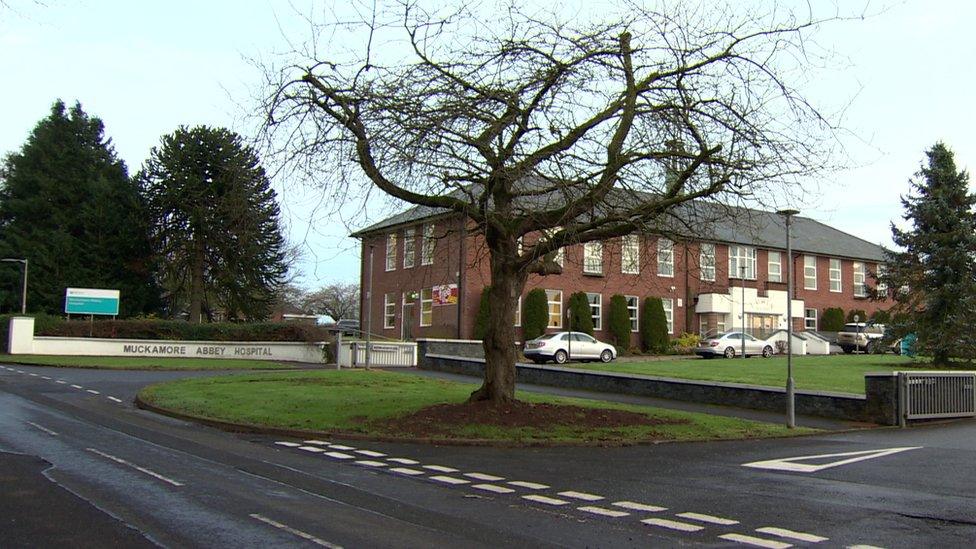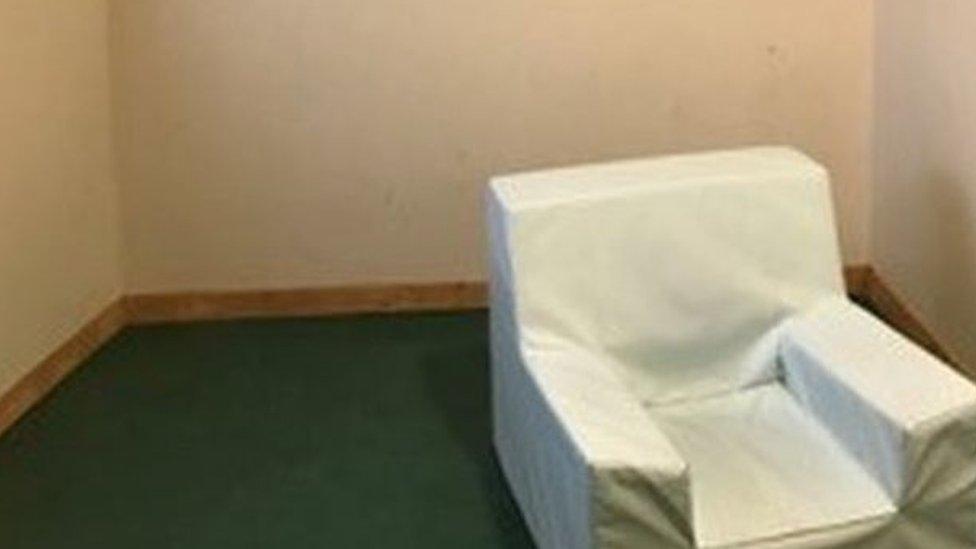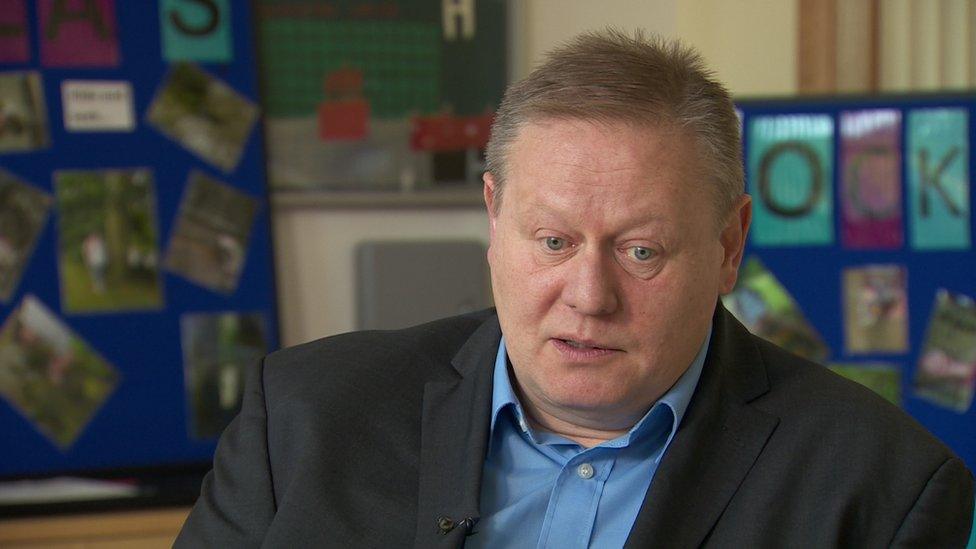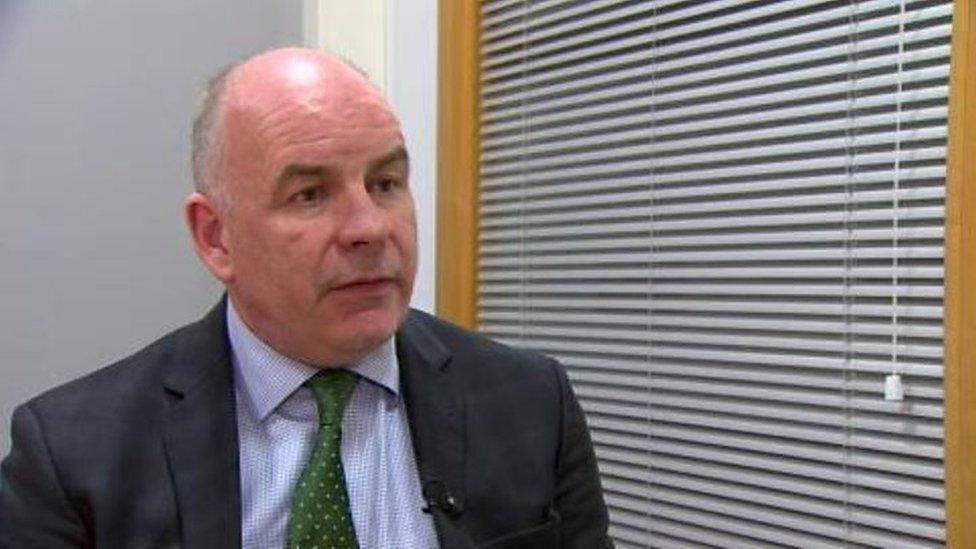Muckamore Abbey Hospital: Belfast Trust spends £4m on vacancies
- Published

A report about Muckamore Abbey Hospital listed a series of catastrophic failings
The Belfast Health Trust has spent £4m on agency staff in order to cover vacancies at scandal-hit Muckamore Abbey Hospital, it has emerged.
Some 36 employees have been temporarily suspended. A police investigation is under way into allegations of abuse of patients.
The agency staff, mostly nurses, are travelling from England and further afield to work at the hospital.
They are being paid up to £40 per hour, compared to local hourly rates of £9.
A 30-year-old man, arrested on Monday in connection with the police investigation, has been released on police bail.
The outgoing chief executive of the Belfast Trust has expressed frustration at the investigation's slow progress.
But Martin Dillon said he appreciated the police investigation must take priority, adding that the trust should not do anything to compromise it.
Staff shortages
Between 2017 and September 2019, £4.1m was spent covering vacancies, staff absenteeism and cover for those suspended from duty, BBC News NI has learnt.
It has also emerged that 20 additional registered nurses are required to start working at the hospital on 1 November 2019, placing further pressure on the system.

A seclusion room in the hospital was described as a "dark dungeon" by a parent of a patient
All five of Northern Ireland's health trusts have now been asked to provide specialist nursing staff from the community sector, placing even more pressure on an already stretched service.
Meanwhile, the Belfast Health Trust has confirmed that there are currently six staff, including nursing and senior nursing assistants, working out their notice.
Concern has been growing about the stability of Muckamore Abbey Hospital since last December when the PICU unit was temporarily closed due to staff shortages.

Northern Ireland's chief social worker Sean Holland says trust has broken down
The Department of Health's chief social worker, Sean Holland, told BBC News NI there would be a managed closure of the hospital - although that process would not happen soon.
"Anyone who works in this work, it's hard and challenging but the reasonable expectation from the families is that people will do that work well with dedication and to certain standards," he said.
Tumultuous tenure
The outgoing head of the Belfast Trust has apologised to all the families affected by the scandal.
Martin Dillon, who is to retire at the end of the year, said he knew of several individuals whose practice and care had fallen below acceptable standards, adding that the trust would not hesitate to take the appropriate action when possible.
"No matter how frustrating that is for us at this time we understand we have to wait and work alongside the police," he told BBC News NI.
The 61-year-old former accountant took up the reins in February 2017, and has been in charge during one of the most tumultuous times in the trust's history.
As well as the Muckamore investigation, the neurology patient recall, hyponatraemia scandal and lengthening hospital waiting lists have all made headlines in the past three years.
With two live investigations under way, Mr Dillon said he was satisfied the trust had turned a corner and that patients at Muckamore were being cared for in a safe environment.
Some of the patients' families, however, want a public inquiry into the scale of the abuse - and how it was allowed to happen.

Martin Dillon is due to retire at the end of the year
The neurology scandal has resulted in the recall of 3,000 patients - the biggest patient recall ever in Northern Ireland.
Many were believed to have been misdiagnosed or received the wrong drug treatment while under the care of consultant neurologist Dr Michael Watt.
While patients' care and treatment has been reviewed, a report due to be published by the Department of Health detailing the scale of the misdiagnosis was cancelled at the last minute.
Mr Dillon said this was not acceptable.
"At some point we need to explain to the public what we found in the recall," he said. "But there are some obstacles that we in the trust can do nothing about."
Asked if a criminal investigation was likely, Mr Dillon said: "As we go through our investigation, if we find anything that merits referral to PSNI or anyone else we, will not hesitate to take that action."
Mr Dillon did not try to defend the issue of spiralling hospital waiting lists.
"You can't reform your way out of a capacity gap, so we desperately need a fully-funded elective care plan for Northern Ireland," he said.
"We as a health service would be more than prepared to have strings attracted to that, including a commitment to further reform of outpatient care."
He also paid tribute to his 22,000 members of staff and their diligence to patients.
- Published16 August 2019

- Published1 October 2019
